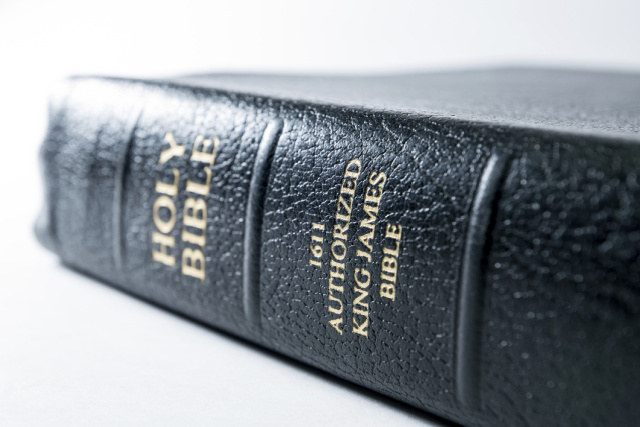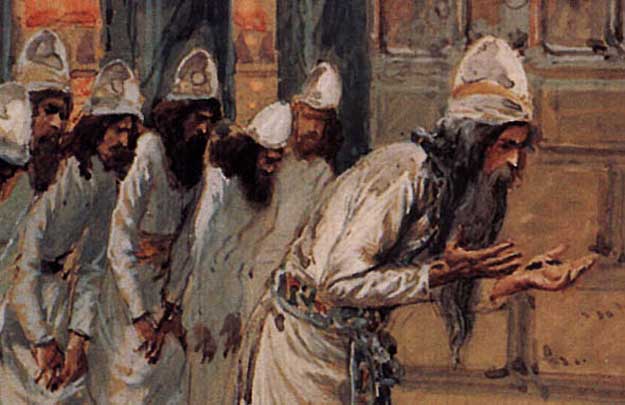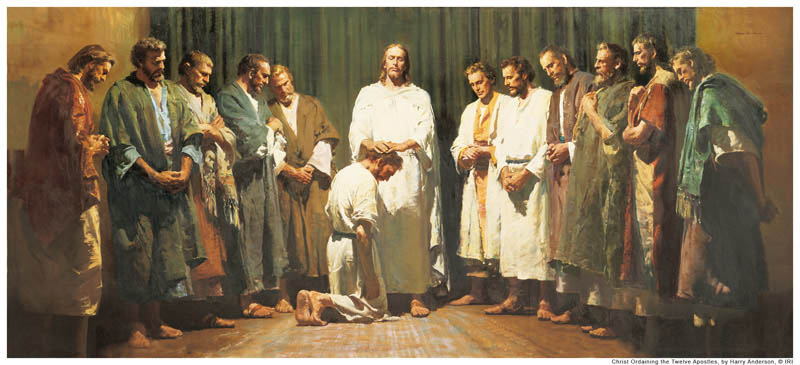Question
Gramps,
In which specific place in the bible did the 12 apostles receive the priesthood by the laying of hands from Christ?
Omi
Answer
Omi,
Let me start off by referring you to a previous answer that will answer part of yours:
When did Christ give His apostles the Melchizedek Priesthood?
Now for me to expand more on your question. What you are asking was actually shown in two places in the New Testament.
Ye have not chosen me, but I have chosen you, and ordained you, that ye should go and bring forth fruit, and that your fruit should remain: that whatsoever ye shall ask of the Father in my name, he may give it you.
13 And he goeth up into a mountain, and calleth unto him whom he would: and they came unto him.
14 And he ordained twelve, that they should be with him, and that he might send them forth to preach,
15 And to have power to heal sicknesses, and to cast out devils:
I would point out that while these verses do not use the phrase “laying on of hands,” it does state that He “ordained” the Twelve. The actual form of “laying on of hands” to ordain to the priesthood or any position is not firmly established in ancient scriptures by a literal reading of the text alone. We have to understand that the meaning of “ordain” in non-religious contexts and philosophical simply meant “appoint”. But in all religious appointments, a ceremony was always involved. While it is reasonable to assume that their ceremonies are similar to ours, it may or may not have been so.
Even in the account of the Savior ordaining the twelve barely mentions something to this effect.
36 And it came to pass that when Jesus had made an end of these sayings, he touched with his hand the disciples whom he had chosen, one by one, even until he had touched them all, and spake unto them as he touched them.
37 And the multitude heard not the words which he spake, therefore they did not bear record; but the disciples bare record that he gave them power to give the Holy Ghost. And I will show unto you hereafter that this record is true.
Remember that the scriptures are about relating spiritual truths to us on how to establish our relationship with the Lord. Other than the D&C and parts of the Torah, scriptures are not meant to be a step-by-step manual on the operations of the Church. That is why we have prophets to establish manuals about that sort of thing.
So, as a general record of happenings of the day, it may be that the procedure that we’re familiar with was so common that it didn’t need mentioning, or that the ceremony was somewhat different than what we use today.
The Old Testament, for instance shows instances of “anointing” on various parts of the head for various religious rites (1 Samuel 16:13, Isaiah 61:1) as well as the coronation ceremony for kings. Compare the differences between (1 Samuel 9:16 and 1 Kings 1:39). One verse only said that the king was anointed. The other verse specifically talks about anointing with oil. It wasn’t necessary to mention the oil because “anointing” means “to place oil on.” And pretty much everyone knows that was the method.
In this dispensation, we don’t use oil (with a couple exceptions, such as healing blessings). But we perform a similar ceremony for all callings and ordinations. Thus we know that is how it is done.
Most of the Christian world has no idea how they went about various ordinances in ancient times. They can’t agree on whether dabbing with water (sprinkling) or immersion is the proper mode of baptism. They can’t even agree on whether baptism was is a necessary ordinance even when Jesus said so.
But as members of the Lord’s Church, we know how ordinations occur. We lay hands on people. We do the same for setting people apart for various callings. But I don’t know how common it is to actually utter the phrase “laying on of hands” for priesthood ordination, much less setting apart for a calling. We talk about it generally. We may even teach it. It’s written in manuals. But it we don’t normally say it out loud all that much when we’re going through the actual procedure. We don’t have to. We all know that is what we do. So, we just get people together and simply say,”We need to ordain Bro. so-and-so.”
Have you ever heard anyone say, “We’d like to sustain Brother Jones to be ordained to the office of elder by the laying on of hands“? I never have. We simply say we’re going to ordain him. And we all know what that means.
Gramps







